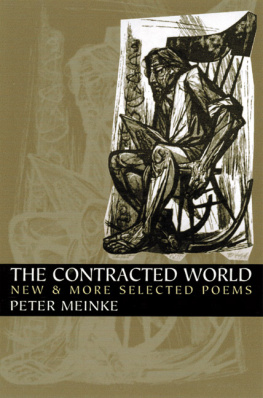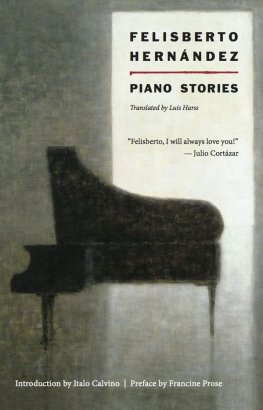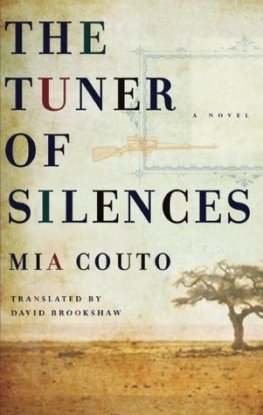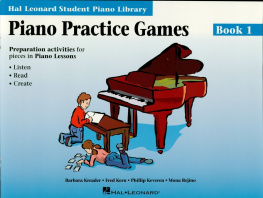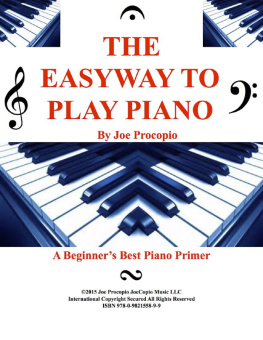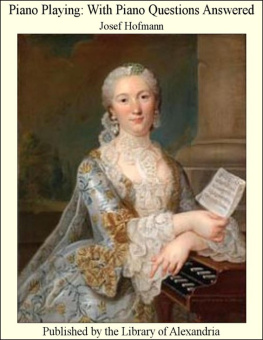Acknowledgments
The author and the publisher gratefully acknowledge the magazines and anthologies in which some of the stories in this volume first appeared.
The Piano Tuner and The Twisted River were published in the Atlantic Monthly, and The Piano Tuner was subsequently selected for inclusion in The Best American Short Stories 1985 (Houghton Mifflin).
Losers Pay first appeared in the Carleton Miscellany.
Even Crazy Old Barmaids Need Love was originally published in Gallery.
A Decent Life first appeared in the Virginia Quarterly Review.
Alices Brother, The Ponoes, Conversation with a Pole, and The Bracelet were published in Yankee, and The Ponoes was selected for inclusion in Prize Stories 1983: The OHenry Awards (Doubleday & Company).
Ruby Lemons first appeared in From Mt. San Angelo: Stories, Poems, and Essays (Associated University Presses).
Previous winners of
THE FLANNERY OCONNOR AWARD FOR SHORT FICTION
David Walton, Evening Out
Leigh Allison Wilson, From the Bottom Up
Sandra Thompson, Close-Ups
Susan Neville, The Invention of Flight
Mary Hood, How Far She Went
Franois Camoin, Why Men Are Afraid of Women
Molly Giles, Rough Translations
Daniel Curley, Living with Snakes
Tony Ardizzone, The Evening News
Salvatore La Puma, The Boys of Bensonhurst
Melissa Pritchard, Spirit Seizures
Philip F. Deaver, Silent Retreats
Gail Galloway Adams, The Purchase of Order
Carole L. Glickfeld, Useful Gifts
Antonya Nelson, The Expendables
Nancy Zafris, The People I Know
Debra Monroe, The Source of Trouble
Robert H. Abel, Ghost Traps
T. M. McNally, Low Flying Aircraft
Alfred DePew, The Melancholy of Departure
Dennis Hathaway, The Consequences of Desire
Rita Ciresi, Mother Rocket
Dianne Nelson, A Brief History of Male Nudes in America
The Piano Tuner
The piano tuner was a huge man, crowding the doorway. I hadnt known he was coming, but I got up from my desk to let him in; my wife was still out shopping. His head was small for his body, and his belt was almost hidden by the belly folding over it. I suppose I came up to about his shoulders, and the reek of his sweat was stunning. His stained T-shirt announced THE PIANO EXCHANGE.
Wheres the piano? he said.
In there. I pointed toward the music room. But theres nothing much wrong with it.
Yeah, well see. His voice resonated like the bass in a barbershop quartet.
I led him through the living room to the small music room. In one corner the mahogany of my wifes Russian-made harp glowed in the late-afternoon sunlight. By the casement windows on the right stood my old piano, painted black. Its an 1899 Kimball, I told him. I was proud of this handsome antique, with its scrolled legs and matching bench.
No, its not that old, the piano tuner said sourly, but it looks like a Kimball all right.
It says Kimball. I pointed to the gold lettering.
He bent over the keys, shaking his little head. That means shit. Thisll take some time; Ill go get my tools. He straightened up with a sudden intake of breath, as if someone had kicked him in a kidney. Jesus, he said.
I wanted to go back to my desk to continue my work. Fredericks would be furious if my review was late again, but this one was proving particularly troublesome. The problem was, I knew all the authors; there was no one I could attack with relative impunity. Van Buren was clearly the weakest, but he had said such good things about my last book, I had to reciprocate somewhat. Prokol was a friend of Frederickss. I had just about decided to stick it to Foreman, who was pretty good but without influence, when the piano tuner rang.
I wished my wife wouldnt make these appointments without telling me. Besides, it was my piano and it sounded all right to me. I had been practicing Durands Valse, a not-too-difficult but flashy piece with lots of runs on the right hand and oompah on the left, and I hadnt noticed anything. Maybe the B-flat stuck a little now and then. I practiced hard when my wife was out, though I pretended never to practice at all. She was a pretty good harpist, but had to work hard at it.
I wouldnt feel right going back to my study with this massive lout of a piano tuner lumbering through the house. Who was he to say my piano was not that old? We had a lot of expensiveirreplaceable, reallysouvenirs scattered around; he might just slip our Wedgwood ashtray into his pocket, or a wooden plate from Poland into the khakis bunched below his gargantuan stomach. Where was he, anyway? I looked out the front door. He was standing in our driveway, next to a dilapidated VW van, talking to a thin black man about half his size. The vans windows were painted crudely, in childlike strokes, with a continuous forest scene; on the back were what appeared to be the turrets of a castle. Whenever a car wandered down our narrow, curving street, the black man would lean back and deliver a sharp karate-style kick toward the car, which would swerve to the other side and then move on. The piano tuner paid no attention to this but kept talking intently, crouched over, fingers jabbing the air. When he saw me watching, he called out, Help me with these, will you? I noticed two large metal toolboxes at his feet.
The thought occurred to me that there were just two boxes and he had two hands, but his tone was so peremptory that I walked down the driveway to comply. Up close, the black man was startling to look at: the skin on his face, arms, and hands had large, irregular patches of pink. I was consciously not staring at him, but he said, What you look-in at, man? Of course, I didnt reply, and turned to the piano tuner instead.
If I was a little more diseased, the black man said, stepping between us, I be white like you. He leaned away, aiming his foot at me, but as I jumped backward he reversed and bent steeply toward me, snapping his foot behind him into the side of the van, leaving a good-sized dent.
The piano tuner had already started toward the house, carrying one of the toolboxes as lightly as if it were empty, and he didnt turn around. I hefted the other one and lurched after him. Watch out for the flowers! I shouted, not knowing whether to look in front or in back of me. His great square-toed boot had just crushed one of our azalea cuttings alongside the driveway. I had told my wife it was asking for trouble, planting them so close to where people walk, but she was an incurable optimist, believing somehow that everyone would be careful and sensible, would keep within the proper boundaries. Twice a year she pruned our azaleas, potting the cuttings for two months in just the proper mixture of vermiculite and peat moss before transferring them to various parts of our property in her ongoing beautification program. She was the neighborhoods answer to Lady Bird Johnson.
The piano tuner paused on the doorstep, waiting for me to open the door for him. My wife loves azaleas, I said, so please be careful of them.
I dont like flowers, myself, he said. They bother my asthma. I had already noticed his heavy breathing. With a sinking heart I opened the door and led him in, trying to get him to follow my example of not stepping on our delicate Persian rugs, mementos of our year in Iran. But he blindly and heavilygreasily, muddilytramped straight across them into the music room. With surprising dexterity and speed for such a heavy man he had the top and front panels of the piano off in a minute. The exposed keys huddled together like ranks of suddenly naked soldiers. He set up the tuning hammer and began hitting single notes over and over.


